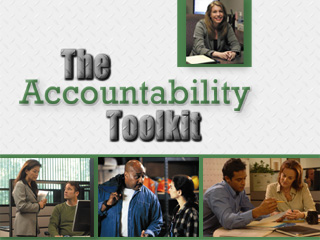Soft-skills learning solutions that help improve the performance of individuals, teams & organizations
DVD's - Accountability
Accountability That Works! - DVD (DS)
Duration: 22 minutes
Accountability That Works! is an exciting, innovative training program that will provide everyone in your organization with the tools they need for a greater sense of empowerment, effectiveness and increased productivity. Participants will learn to view accountability as an ongoing process, a method for achieving personal effectiveness.
When you have accountability in your organization you have better results, improved teamwork & clarity. When you don't have accountability, you get blame, finger pointing, missed deadlines, etc.
Accountability That Works! presents a simple process structure: the "before" phase, the "during" phase and the "after" phase which are common to all tasks. When handled as instructed, this structure will ensure the clarity and completion of any task.
The Cycle of Accountability presented is:
- The "before" phase: RESPONSIBILITY - When an individual or team establishes a mindset of ownership for the task and taking complete responsibility for getting it done.
- The "during" phase: EMPOWERMENT - When the owner(s) does whatever is necessary to complete the task. Identifying action steps, a time line and gathering necessary resources.
- The "after" phase: ACCOUNTABILITY - When the responsible party(ies) owns the outcome of the task. Regardless of the results, they are acknowledged and learning from the experience takes place.
- And Behind It All: CLEAR AGREEMENTS - The glue that holds the three stages together so that accountability works!
---------------------------------------------------------------------------------------------------------------------------------------------
Accountability Toolkit - DVD (DS)
Duration: 56 minutes
What makes a person accountable? This Toolkit contains 38 video clips that illustrate these behaviours in a variety of workplace settings.
Benefits:
- Supports staff development initiatives by modeling 9 principles of personal responsibility
- Improves efficiency by emphasizing clear communication, goal setting and follow through
- Maximizes training budgets with a library of video clips that can be used in a variety of applications
These days, when everyone seems to have a different idea of what "accountability" means, It's hard to know. But when you simply look at it from the perspective of what it takes to be a person others can rely on, certain specific behaviors emerge.
The clips are diverse — many take place in a generic work environment, some occur in a manufacturing or hospitality environment and others feature healthcare or education workers. They can be shown to make keypoints in meetings and presentations, or used as content for internal courses you are building. The clips fall under these categories and can be used to make the following points:
-
Take Ownership & Keep Commitments – When accepting responsibility for a task or project, take full ownership and do what you say you're going to do. For clarity, set deadlines - then keep them.
-
Be Proactive – Take the initiative in seeking improvements to processes and practices. Work to improve your own skills, and influence others toward improvement.
-
Communicate With Clarity & Set Measurable Goals – Getting to the result requires clear agreements and an understanding of expectations and instructions. Accountability for results begins with clear directions.
-
Be Ethical – Know What's right-by law, by policy, by procedure, by best professional practice--and act accordingly. Make decisions for the best outcome when two "rights" conflict.
-
Be a Problem Solver – Apply your own experience and knowledge to every problem. With this mindset, you'll plan and take action towards a solution, rather than waiting for others to get things started.
-
Serve Customers Professionally – Every person you serve and work with deserves your best effort. Know the technical and procedural aspects of your work and bring a positive attitude to the service you provide.
-
Don't Be Afraid to Speak Up – Know what you need and what you deserve. In a professional manner, let others know it too. Those you work with and for may not realize when their actions are getting in the way.
-
Accept Feedback and Learn From Mistakes – Learning and changing direction happen quickly and frequently in an accountable environment. Listen non-defensively, choose to adjust, and move on.
-
Supervising and Managing an Accountable Workforce – Often held accountable for the work of others, managers and supervisors must first model accountable behaviors, then learn to require this type of responsibility from those who report to them. The manager can make or break an accountable team.
